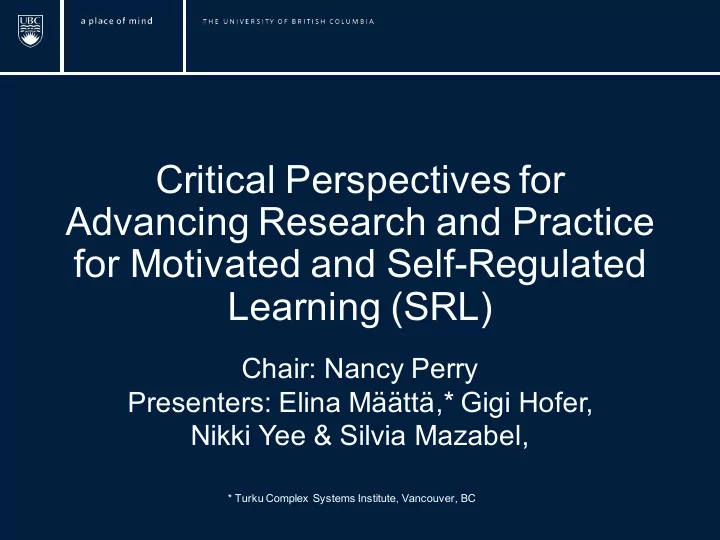

Critical Perspectives for Advancing Research and Practice for Motivated and Self-Regulated Learning (SRL) Chair: Nancy Perry Presenters: Elina Määttä,* Gigi Hofer, Nikki Yee & Silvia Mazabel, * Turku Complex Systems Institute, Vancouver, BC
Presentations examine … • teachers’ development and use of motivation and SRL-promoting practices in a variety of contexts; • whether and how learners perceive these supports; • whether and how they associate these supports with success in and beyond school. Together they represent innovative attempts to … • Translate motivation and SRL research into practice; • Reach more diverse groups and contexts.
SRL Perspectives What is self-regulation? • Ability to control thoughts and actions to meet goals and respond to • environmental stimuli (Zimmerman, 2008) Self-regulating learners are proactive in their efforts to learn … • aware of their strengths and limitations … guided by personally set goals and task related strategies (Zimmerman, 2002) They … • Attend to key features of the • environment Resist distractions • Persist when tasks are difficult • Respond appropriately, adaptively, • flexibly Targets for self-regulation include: cognition, • motivation, emotion, behavior SRL supports learning in both independent • and social situations
Fostering Self-Determination How do we help children and youth to be “self-motivated”—to feel in control/able to take control of their life circumstances? Support for … Increased Motivation Threat to - Autonomy Well-Being - Belonging • Agency - Competence • Engagement • Stress • Commitment • Boredom Decreased Self-regulation both supports and results from self-determination
The Posters • Määttä & Järvelä. Self-regulated learning promoting practices from students’ perspectives . • Hofer & Perry. Former students’ percpectives of the impact of their alternative education experiences . • Yee, Perry, & Restrepo. Using self-regulated learning to support inclusion . • Mazabel, Dantzer, & Perry. Musician’s perspectives on self-regulated learning in an after school music program .
Session Structure • Overview • Introduction to the projects • Viewing posters and interacting with presenters • General discussion
Selected References Bandura, (1997). Self-efficacy. The exercise of control. W.H: Freeman & Company. Butler, D. L., & Schnellert, L. (2012). Collaborative inquiry in teacher professional development. Teaching and Teacher Education, 28, 1206-1220. Clandinin, J. D. and Connelly, M. F. (2000). Narrative inquiry: Experience and story in qualitative research . San Francisco: Jossey-Bass Publishers. Deci, E. L. & Ryan, R. M. (2002). Overview of self-determination theory: An organismic- dialectical perspective. In E.L. Deci, R.M., Ryan, E. L (Eds), Handbook of self-determination research. (pp. 3-33). Rochester, NY US: University of Rochester Press. Halbert, J., & Kaser, L. (2013). Spirals of inquiry for equity and quality. BC Principals and Vice-Principals Association. Määttä, E. (2015). Setting young children up for success: Approaching motivation through children's perceptions of their ability. Doctoral Dissertation. Oulu: University of Oulu. Perry, N. E. (2004). Using self-regulated learning to accommodate differences amongst students in classrooms. Exceptionality Education in Canada, 14 (2 & 3), 65-87.
Selected References Perry, N. E., Brenner, C. A., & MacPherson, N. (2015). Using teacher learning teams as a framework for bridging theory and practice in self-regulated learning. In T.J. Cleary (Ed.) Self-regulated learning interventions with at-risk youth (pp. 229-250). Washington, DC: American Psychological Association. Reeve, J., Bolt, E., & Cai, Y. (1999). Autonomy-supportive teachers: How they teach and motivate students. Journal of Educational Psychology, 91 (3), 537-548. Rose, D. H., & Gravel, J. W. (2010). Universal design for learning. In E. Baker, P . Peterson & B. McGaw (Eds.), International encyclopedia of education (3rd ed.). Oxford: Elsevier. Tomlinson, C. A., & Imbeau, M. B. (2010). Leading and managing: A differentiated classroom . Alexandria, Virginia: ASCD. Zimmerman, B. J. (2000). Attaining self-regulation: A social cognitive perspective. In M. Boekaerts, P . Pintrich & M. Zeidner (Eds.), Handbook of self regulation . (pp. 13-39). New York: Academic Press. Zimmerman, B. J. (2002). Becoming a self-regulated learner: An overview. Theory into Practice, 41 (2), 64-70. Zimmerman, B. J. (2008). Investigating self-regulation and motivation: Historical background, methodological developments, and future prospects. American Educational Research Journal, 45, 166-183.
Recommend
More recommend